- Home
- Leo Tolstoy
Lives and Deaths
Lives and Deaths Read online
LEO TOLSTOY
LIVES AND DEATHS
ESSENTIAL STORIES
Translated from the Russian
by Boris Dralyuk
PUSHKIN PRESS
LONDON
CONTENTS
TITLE PAGE
TRANSLATOR’S PREFACE
The Death of Ivan Ilyich
Pace-setter: The Story of a Horse
Three Deaths
Alyosha the Pot
TRANSLATOR’S ACKNOWLEDGEMENTS
ABOUT THE PUBLISHER
COPYRIGHT
TRANSLATOR’S PREFACE
THE PROSPECT of writing briefly about Count Leo Nikolayevich Tolstoy (1828–1910)—whose life spanned nearly a century of political changes and fervent intellectual debate in Russia and abroad, and whose complete works occupy 90 austere volumes (with a new 100-volume edition now in preparation)—is daunting indeed.1 Still more daunting is the prospect of selecting and translating his “essential stories”. At first, the word “essential” lent a heartening clarity to the mission, for it was perfectly obvious to me that no subject was more essential to Tolstoy’s work than that of death. But soon I was in the dark again. After all, as the Russian émigré author Mark Aldanov (1886–1957) wrote some years after Tolstoy’s own uneasy demise at a train station, no other writer had ever before amassed such a “treasure chest” of artistic depictions of death.2 And even if we take the novels and spiritual writings out of consideration, we are still left with a wealth of novellas and stories that grapple with the essence of life in its final moments.
As I read and reread the stories, however, patterns began to emerge, and with them a more definite goal. I wanted to present writing from every stage of Tolstoy’s career—early, middle and late—that would trace the author’s continued, evolving, all-consuming engagement with the twinned questions of what makes for a good life and what makes for a good death. I also wanted to highlight what I believe to be the heart of Tolstoy’s artistic gift, the breathtaking fearlessness of his imagination, which allowed him both to approach what most of us are unwilling to ponder and to thrill us with his depiction of it, rendering us incapable of turning away.
It seemed only natural that the collection should open with The Death of Ivan Ilyich (1886), the title of which announces its focus in no uncertain terms. The consummately “decent” (not a laudatory term in Tolstoy’s lexicon) life that leads to the protagonist’s painful death is sketched out with an efficiency that can fairly be described as ruthless, while the death itself unfolds slowly; we are made to taste, though not to savour it. The novella is difficult to read, and difficult to translate—for that requires a much slower, more careful reading—but it is impossible to forget. However one understands the judgement meted out to Ivan Ilyich, and regardless of whether one agrees with or rebels against it, one is changed forever by the trial.3
The second tale in the volume, which I have titled “Pace-setter: The Story of Horse”,4 bridges two phases of Tolstoy’s creative life. Begun in 1863, it lay dormant until 1885, when the author’s wife discovered the manuscript among his papers and encouraged him to prepare it for publication. For this, and for much else, we owe Sofia Tolstaya a great debt; in its final version, “Pace-setter” is a remarkable feat of empathy and invention. While the narrative of Ivan Ilyich burrows inwards, growing ever more narrow, the story of Pace-setter expands in wholly unexpected ways, offering us a fresh—if not refreshing—perspective on our world.5
Remarkably, this power to freshen our vision was available to Tolstoy from the start. It is already on display in the closing section of “Three Deaths”, a brief story written over the course of a few days in 1858. I will not spoil the effect of its ending by discussing it here, but I will say that I chose to include the story because its core concerns are echoed in much of the author’s later work: the tension between our earthly desires and our spiritual needs; between faith and religion; between the ways of the common folk and those of the civilized elite; and between the realm of humanity and the realm of nature.
Whether these tensions were productively resolved by Tolstoy after his religious awakening in the late 1870s—or, indeed, whether they can ever be resolved—is an open one. But near the end of his life Tolstoy came strikingly close to portraying, in just a few pages, the resolution of all tension. D.S. Mirsky, the great historian of Russian literature, calls Tolstoy’s “Alyosha the Pot” (1905) “a masterpiece of rare perfection”. Its titular hero, Mirsky writes, is “a peasant boy who was all his life everyone’s drudge but, in his simplicity of soul and meek, unquestioning submission (non-resistance) knew that inner light and purity of conscience, that perfect peace, which was never attained by the conscious, rational, restless soul of Tolstoy”.6
It is my hope that this collection charts Tolstoy’s restless, lifelong, perhaps tragic yet eternally resonant search for an inner light.
Notes
1 Luckily, an especially engaging brief introduction, Donna Orwin’s Simply Tolstoy, has recently been published (New York: Simply Charly, 2017).
2 Mark Aldanov’s The Riddle of Tolstoy (Zagadka Tolstogo) (Berlin: Izdatel’stvo I.P. Ladyznikova, 1923; reprinted, Providence, RI: Brown University Press, 1969), which has never been translated into English, remains an indispensable critical—in every sense of the word—guide to Tolstoy’s thought. Aldanov’s fellow émigré, Ivan Bunin, engages with his analysis of the question of death in Tolstoy’s work in The Liberation of Tolstoy: A Tale of Two Writers, which has been translated and edited by Thomas Gaiton Marullo and Vladimir T. Khmelkov (Evanston, IL: Northwestern University Press, 2001), p. 129 and passim.
3 Much has been written about this novella. An excellent place to start is Tolstoy’s The Death of Ivan Il’ich: A Critical Companion, ed. Gary R. Jahn (Evanston, IL: Northwestern University Press, 1999).
4 The Russian name of Tolstoy’s titular horse is “Kholstomer”—literally, “one who measures linen”, a phrase that doesn’t sound much like the name of a horse in English. He is called Kholstomer on account of his long, regular stride; his gait, in other words, could be used to measure lengths of linen. In their excellent early translation, Louise and Aylmer Maude call the horse “Strider”. Their solution is very effective indeed, even though it now brings to mind the work of another big T: Tolkien. I have opted for “Pace-setter”, which suggests impressive speed and regularity, while at the same time foreshadowing the horse’s fate: he isn’t meant to win. Like the measurer of linen, a pace-setter is a common worker, not a member of the elite. And by telling his life story in slow, measured tones, Pace-setter also adjusts the pace of the younger, friskier horses around him, who stand still and listen in awe.
5 It’s not by chance that Viktor Shklovsky cites the story as one of the key examples of Tolstoy’s use of “defamiliarization”, the device of making the familiar strange, which the critic and his formalist colleagues regarded as central to literary art. See Theory of the Prose, translated by Benjamin Sher, introduction by Gerald L. Buns (Normal, IL: Dalkey Archive Press, 1991).
6 D.S. Mirsky, A History of Russian Literature from Its Beginnings to 1900, ed. Francis J. Whitfield (Evanston, IL: Northwestern University Press, 1999), p. 321.
LIVES AND DEATHS
THE DEATH OF IVAN ILYICH
I
IN THE LARGE BUILDING that housed the halls of justice, during an adjournment in the Melvinsky trial, the members of the court and the public prosecutor gathered in the office of Ivan Yegorovich Shebek. Their talk soon turned to the famous Krasovsky case. Fyodor Vasilyevich grew heated, insisting on the manifest lack of jurisdiction, Ivan Yegorovich wasn’t swayed, while Pyotr Ivanovich, who had kept out of the fray from the start, leafed through the latest issue of the Gazette, which had ju
st been delivered.
“Gentlemen,” he interrupted, “Ivan Ilyich is dead.”
“Can’t be…”
“Here, have a look,” he replied, handing the fresh, still pungent pages to Fyodor Vasilyevich.
The announcement was bordered in black: “It is with deepest sorrow that Praskovya Fyodorovna Golovina informs relatives and friends of the demise of her beloved spouse, Member of the Appellate Court Ivan Ilyich Golovin, which occurred on 4th February 1882. The funeral will be held on Friday, at one o’clock in the afternoon.”
Ivan Ilyich had been a colleague of the assembled gentlemen, well liked by all of them. He had been ill for several weeks; they had heard the illness was incurable. His position had been kept open, but it was assumed that, in the event of his death, Alekseyev would be appointed to replace him, while Alekseyev’s position would be filled by either Vinnikov or Stabel. And so, upon learning of Ivan Ilyich’s death, the first thought that occurred to each of the gentlemen gathered in the office concerned the potential reassignments or promotions that this death might occasion for the members themselves or for their acquaintances.
Now I’ll surely be named to replace Stabel or Vinnikov, thought Fyodor Vasilyevich. They’ve been promising me a promotion for a long time. And it means a raise of eight hundred roubles, along with an allowance.
I’ll have to apply for my brother-in-law’s transfer from Kaluga, thought Pyotr Ivanovich. Yes, that ought to make my wife very happy indeed. No more complaints about my never doing anything for her family.
“I sensed he was a goner,” Pyotr Ivanovich stated. “A pity.”
“What was it, anyway?”
“The doctors couldn’t say, exactly. That is, they all said different things. When I last saw him, it looked like he might still recover.”
“I hadn’t seen him since the holidays myself, though I kept meaning to visit…”
“Did he have much property?”
“I think his wife has a little. Hardly anything.”
“Well, we’ll have to go, I suppose. They lived so terribly far away.”
“You mean so terribly far from you. You’re far from everything.”
“See? He’ll never forgive me for moving to the other side of the river,” Pyotr Ivanovich said, smiling at Shebek. And so, speaking of distances between this and that part of the city, they made their way back to the hearing.
In addition to considerations of transfers and other potential career changes that this particular death might bring about, the very fact of the death of a close acquaintance prompted in each person who learnt of it, as such things always do, a joyous sense that it was he who had died, and not they.
Dead. He’s dead, each of them thought, but I’m not. And Ivan Ilyich’s closest acquaintances, his so-called friends, had another thought: it occurred to them, involuntarily, that they would now have to fulfil the dreary obligations of decorum, attending his funeral and paying his widow a visit of condolence.
Fyodor Vasilyevich and Pyotr Ivanovich had been closer to him than anyone.
Pyotr Ivanovich had known Ivan Ilyich since their days at law school, and he considered himself beholden to the man.
After informing his wife over dinner of his colleague’s death and of the possibility of his brother-in-law’s transfer to their district, Pyotr Ivanovich forewent his nap, put on his tailcoat, and drove to Ivan Ilyich’s residence.
A carriage and two cabs stood at the entrance to Ivan Ilyich’s apartment. In the downstairs hallway, resting against the wall by the coat stand, was a glazed brocade coffin lid trimmed with tassels and a braid that had been polished with powder. Two ladies in black were removing their furs. Pyotr Ivanovich recognized one of them—Ivan Ilyich’s sister—but not the other. His colleague Schwartz was about to descend the stairs, but when he saw Pyotr Ivanovich he paused on the top step and winked, as if to say: Ivan Ilyich made rather a mess of things; you and I would have handled this differently.
Schwartz’s face, with its English whiskers, and the whole of his lanky figure in its tailcoat, had, as usual, an air of elegant solemnity, and this solemnity, which always stood in such stark contrast to Schwartz’s playfulness, was particularly piquant under these circumstances. So thought Pyotr Ivanovich.
Pyotr Ivanovich allowed the ladies to go ahead of him and slowly followed them to the stairs. Schwartz stayed where he was. Pyotr Ivanovich understood why: he wanted to make arrangements for their bridge game that evening. The ladies proceeded up the stairs to the widow, while Schwartz, with his strong, sternly pressed lips and his playful gaze, twitched his eyebrows to point Pyotr Ivanovich to the right, in the direction of the dead man’s room.
Pyotr Ivanovich entered, at a loss as to what he should do, as everyone always is in such cases. Of one thing he was certain: it’s never a bad idea to cross oneself. But he wasn’t entirely sure about bowing, so he compromised: he entered the room crossing himself and bowing ever so slightly. Meanwhile, as far as his arms and head allowed him, he looked around the room. Two young men, one still in high school—nephews, in all likelihood—were moving towards the door, still crossing themselves. An old woman stood motionless. A lady with strangely arched eyebrows was saying something to her in a whisper. An alert, resolute lector in a frock coat was reading something in a loud voice with an expression that suggested he would brook no contradiction. The butler’s helper, Gerasim, passed before Pyotr Ivanovich with light steps and sprinkled something on the floor; as soon as Pyotr Ivanovich saw this, he became aware of the faint scent of a decaying corpse. On his last visit to Ivan Ilyich, Pyotr Ivanovich had seen this peasant, this Gerasim, in his colleague’s study; the fellow had been acting as his master’s nurse, and Ivan Ilyich was especially fond of him. Pyotr Ivanovich kept crossing himself and bowing slightly, aiming at a spot between the coffin, the lector and the icons on the table in the corner. Then, when he felt this crossing movement had gone on too long, he stopped and turned to examine the dead man.
The dead man lay, as dead men always lie, in the uniquely heavy manner of dead men, with his stiff limbs sunk into the lining of the coffin and his head bowed, for all time, on the pillow; his waxen yellow brow, with bald spots at the hollow temples, was thrust forward, as it always is with dead men, and his protruding nose appeared to be pressing down on his upper lip. He had changed quite a lot, had grown even thinner since Pyotr Ivanovich had seen him last, but his face, like all dead faces, was more beautiful, and, above all, more imposing than it had been in life. The expression it bore indicated that what needed to be done had been done, and had been done right. What was more, the expression contained a reproach or reminder to the living. Pyotr Ivanovich found this reminder to be inappropriate or, at the very least, inapplicable to himself. He was suddenly ill at ease, and so he crossed himself once more, hastily, and then—too hastily, it seemed to him, to be consistent with decorum—turned towards the door and left. Schwartz was waiting in the passage room, legs wide apart, both hands toying with his top hat behind his back. A single glance at Schwartz’s playful, well-groomed, elegant figure refreshed Pyotr Ivanovich; he realized that Schwartz stood above all this, that he would never allow this to depress him. His very appearance suggested that the incident of Ivan Ilyich’s service could in no way provide sufficient cause to disrupt the procedure of the meeting, that is, that nothing could prevent them from snapping open a new deck of cards that very evening, while a footman brought in four fresh candles; in general, there was no reason to suppose that this incident would prevent them from enjoying the evening together. That’s precisely what he said, in a whisper, as Pyotr Ivanovich passed by, proposing they meet at Fyodor Vasilyevich’s. But fate seemed to be conspiring against the prospect of cards that evening. Praskovya Fyodorovna—a short, fat woman, who, despite all her efforts to achieve the opposite, grew steadily wider from the shoulders down—dressed all in black, her head covered with lace, with the same strangely arched eyebrows as the woman by the coffin, emerged from her rooms with a group
of ladies, led them to the dead man’s door and announced: “The service is about to begin; please, do go through.”
Schwartz gave a vague bow and remained where he was, apparently neither accepting nor rejecting the invitation. Recognizing Pyotr Ivanovich, Praskovya Fyodorovna sighed, came close, took him by the hand and said: “I know you were a true friend of Ivan Ilyich…” She looked at him, expecting actions that would correspond to her words.
Just as Pyotr Ivanovich had known that it was necessary to cross himself in the dead man’s room, so did he know that it was now necessary to press the woman’s hand, sigh and say: “Believe me…” And so that is what he did, and by doing it, he felt he had achieved the desired result: both he and she were touched.
“Come, let us go before it starts; we must have a talk,” said the widow. “Give me your arm.”
Pyotr Ivanovich surrendered his arm and they went to the inner rooms, passing Schwartz, who gave Pyotr Ivanovich a mournful wink: There goes your game of bridge, old chap. Don’t be offended if we find someone to take your spot. If you manage to slip away, do join us as the fifth, said his playful look.
Pyotr Ivanovich sighed yet more deeply and mournfully, and Praskovya Fyodorovna pressed his arm in gratitude. They entered her drawing room, which was upholstered in pink cretonne and lit by a dim lamp, and sat down at the table—she on the sofa, he on a low pouf with loose springs that yielded awkwardly beneath him. Praskovya Fyodorovna had wanted to warn him about the pouf and direct him to another chair, but she had changed her mind, thinking that such a warning would have been inappropriate for a woman in her position. As he lowered himself onto the pouf, Pyotr Ivanovich recalled how much care Ivan Ilyich had taken in decorating this room, how he had sought his opinion about this very pink cretonne with green leaves. As the widow moved towards the couch (the whole room was stuffed with knick-knacks and furniture), the black lace of her black shawl caught on the carved edge of the table. Pyotr Ivanovich rose to help her, liberating the pouf, which rumbled and gave him a push. The widow began to detach the shawl herself, and Pyotr Ivanovich sat back down, again suppressing the rebellious pouf. But the widow didn’t manage to free the shawl completely, so Pyotr Ivanovich rose once more, at which point the pouf rebelled again and even gave a pop. When all this was finally over, the widow took out a clean cambric handkerchief and began to cry. The episode with the lace and the battle against the pouf had cooled Pyotr Ivanovich’s feelings considerably, and he sat frowning. This uncomfortable situation was interrupted by Sokolov, Ivan Ilyich’s butler, who came in to report that the burial plot Praskovya Fyodorovna had designated would cost two hundred roubles. She stopped crying, glanced at Pyotr Ivanovich with an expression of victimhood, and said, in French, that this was all very difficult for her. Pyotr Ivanovich responded with a silent gesture that was meant to express his utter certainty that this must indeed be the case.

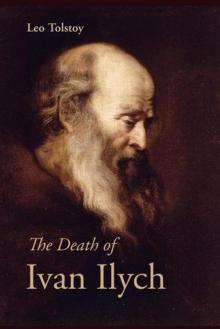 The Death of Ivan Ilych
The Death of Ivan Ilych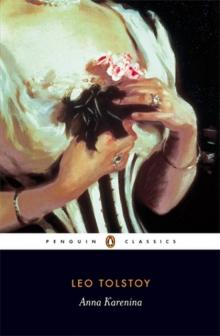 Anna Karenina
Anna Karenina Resurrection
Resurrection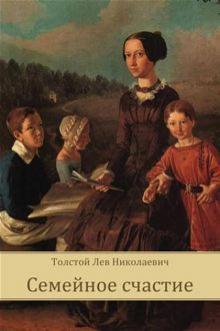 Family Happiness
Family Happiness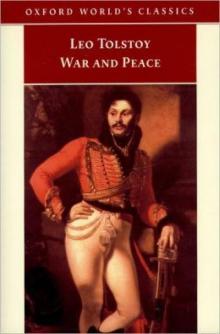 War and Peace
War and Peace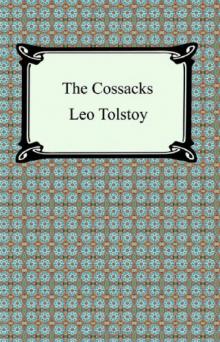 The Cossacks
The Cossacks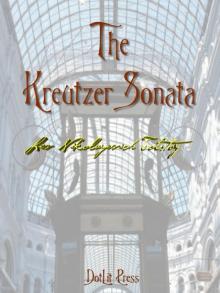 The Kreutzer Sonata
The Kreutzer Sonata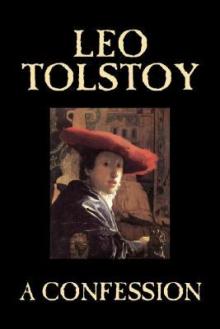 A Confession
A Confession The Kingdom of God Is Within You
The Kingdom of God Is Within You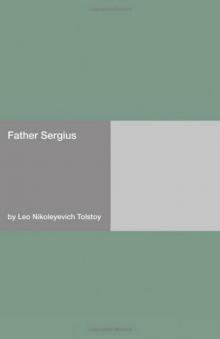 Father Sergius
Father Sergius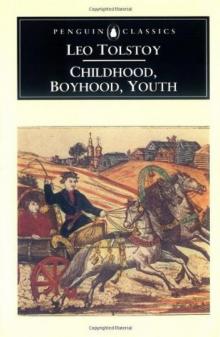 Childhood, Boyhood, Youth
Childhood, Boyhood, Youth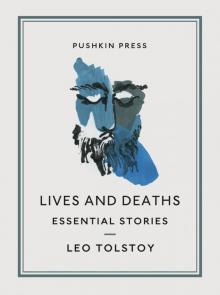 Lives and Deaths
Lives and Deaths The Devil
The Devil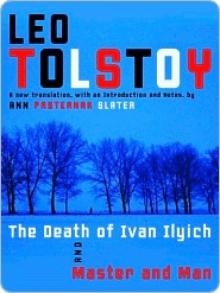 The Death of Ivan Ilyich and Master and Man
The Death of Ivan Ilyich and Master and Man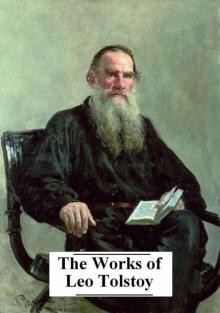 The Complete Works of Leo Tolstoy (25+ Works with active table of contents)
The Complete Works of Leo Tolstoy (25+ Works with active table of contents)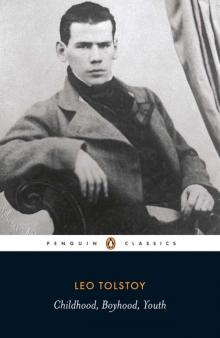 Childhood, Boyhood, Youth (Penguin ed.)
Childhood, Boyhood, Youth (Penguin ed.)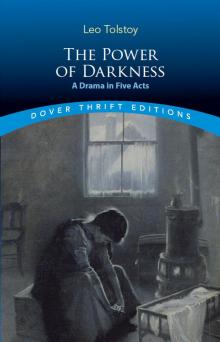 The Power of Darkness
The Power of Darkness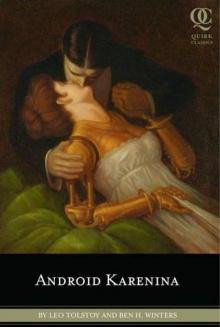 Android Karenina
Android Karenina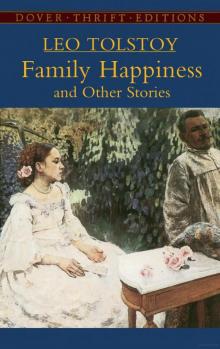 Family Happiness and Other Stories
Family Happiness and Other Stories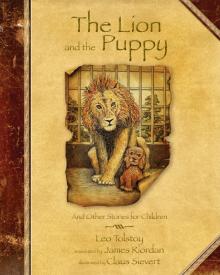 The Lion and the Puppy
The Lion and the Puppy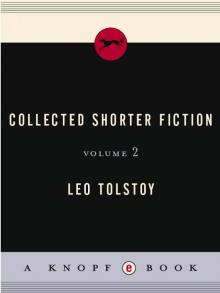 Collected Shorter Fiction, Volume 2
Collected Shorter Fiction, Volume 2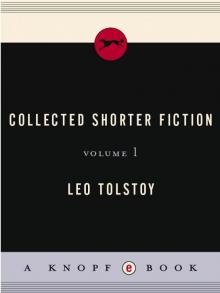 Collected Shorter Fiction, Volume 1
Collected Shorter Fiction, Volume 1